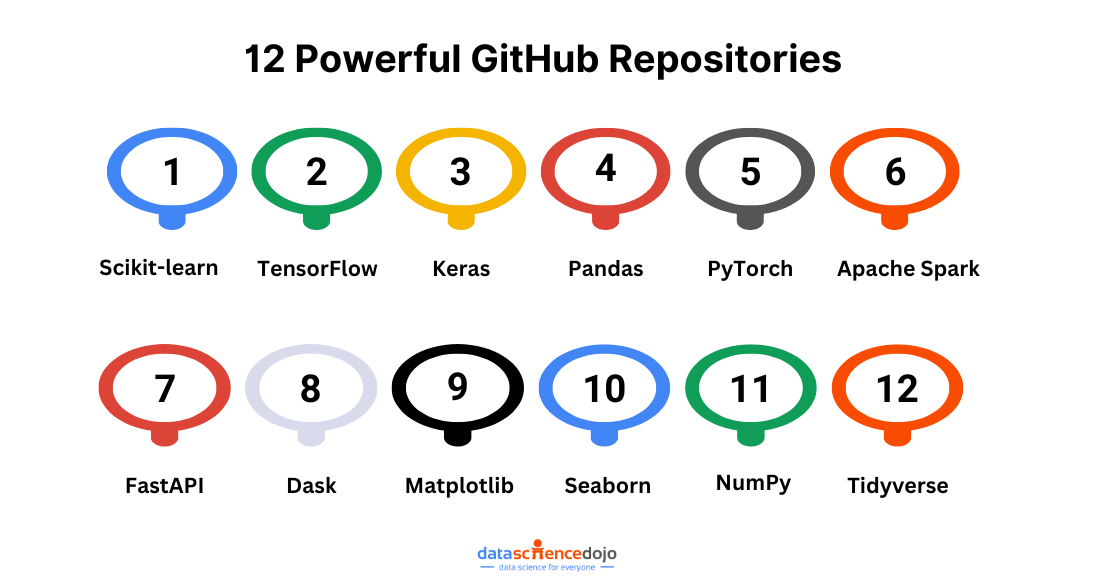GitHub is a goldmine for developers, data scientists, and engineers looking to sharpen their skills and explore new technologies. With thousands of open-source repositories available, it can be overwhelming to find the most valuable ones.
In this blog, we highlight some of the best trending GitHub repositories in data science, analytics, and engineering. Whether you’re looking for machine learning frameworks, data visualization tools, or coding resources, these repositories can help you learn faster, work smarter, and stay ahead in the tech world. Let’s dive in!

What is GitHub?
Before exploring the top repositories, we should first understand what GitHub is and why it’s so important for developers and data scientists.
GitHub is an online platform that allows people to store, share, and collaborate on code. It works as a version control system, meaning you can track changes, revert to previous versions, and work on projects with teams seamlessly. Built on Git, an open-source version control tool, GitHub makes it easier to manage coding projects—whether you’re working alone or with a team.
One of the best things about GitHub is its massive collection of open-source repositories. Developers from around the world share their code, tools, and frameworks, making it a go-to platform for learning, innovation, and collaboration. Whether you’re looking for AI models, data science projects, or web development frameworks, GitHub has something for everyone.
Also explore: Kaggle competitions
Best GitHub Repositories to Stay Ahead of the Tech Curve
Now that we understand what GitHub is and why it’s a goldmine for developers, let’s dive into the repositories that can truly make a difference. The right repositories can save time, improve coding efficiency, and introduce you to cutting-edge technologies. Whether you’re looking for AI frameworks, automation tools, or coding best practices, these repositories will help you stay ahead of the tech curve and keep your skills sharp.
1. Scikit-learn: A Python library for machine learning built on top of NumPy, SciPy, and matplotlib. It provides a range of algorithms for classification, regression, clustering, and more.
Link to the repository: https://github.com/scikit-learn/scikit-learn
2.TensorFlow: An open-source machine learning library developed by Google Brain Team. TensorFlow is used for numerical computation using data flow graphs.
Link to the repository: https://github.com/tensorflow/tensorflow
3.Keras: A deep learning library for Python that provides a user-friendly interface for building neural networks. It can run on top of TensorFlow, Theano, or CNTK.
Link to the repository: https://github.com/keras-team/keras
4.Pandas: A Python library for data manipulation and analysis. It provides a range of data structures for efficient data handling and analysis.
Link to the repository: https://github.com/pandas-dev/pandas
5.PyTorch: An open-source machine learning library developed by Facebook’s AI research group. PyTorch provides tensor computation and deep neural networks on a GPU.
Link to the repository: https://github.com/pytorch/pytorch
6.Apache Spark: An open-source distributed computing system used for big data processing. It can be used with a range of programming languages such as Python, R, and Java.
Link to the repository: https://github.com/apache/spark
7.FastAPI: A modern web framework for building APIs with Python. It is designed for high performance, asynchronous programming, and easy integration with other libraries.
Link to the repository: https://github.com/tiangolo/fastapi
8.Dask: A flexible parallel computing library for analytic computing in Python. It provides dynamic task scheduling and efficient memory management.
Link to the repository: https://github.com/dask/dask
9.Matplotlib: A Python plotting library that provides a range of 2D plotting features. It can be used for creating interactive visualizations, animations, and more.
Link to the repository: https://github.com/matplotlib/matplotlib
10.Seaborn: A Python data visualization library based on matplotlib. It provides a range of statistical graphics and visualization tools.
Link to the repository: https://github.com/mwaskom/seaborn
11.NumPy: A Python library for numerical computing that provides a range of array and matrix operations. It is used extensively in scientific computing and data analysis.
Link to the repository: https://github.com/numpy/numpy
12.Tidyverse: A collection of R packages for data manipulation, visualization, and analysis. It includes popular packages such as ggplot2, dplyr, and tidyr.
Link to the repository: https://github.com/tidyverse/tidyverse
How to Contribute to GitHub Repositories
Now that you know the value of GitHub and some of the best repositories to explore, the next step is learning how to contribute. Open-source projects thrive on collaboration, and contributing to them is a great way to improve your coding skills, gain real-world experience, and connect with the developer community. Here’s a step-by-step guide to getting started:
1. Find a Repository to Contribute To
Look for repositories that align with your interests and expertise. You can start by browsing GitHub’s Explore section or checking issues labeled “good first issue” or “help wanted” in open-source projects.
2. Fork the Repository
Forking creates a copy of the original repository in your own GitHub account. This allows you to make changes without affecting the original project. To do this, simply click the Fork button on the repository page, and a copy will appear in your GitHub profile.
3. Clone the Repository
Once you have forked the repository, you need to download it to your local computer so you can work on it. This process is called cloning. It allows you to edit files and test changes before submitting them back to the original project.
4. Create a New Branch
Before making any changes, it’s best practice to create a new branch. This keeps your updates separate from the main code, making it easier to manage and review. Naming your branch based on the feature or fix you’re working on helps maintain organization.
5. Make Your Changes
Now, you can edit the code, fix bugs, or add new features. Be sure to follow any contribution guidelines provided in the repository, write clear code, and test your changes thoroughly.
You might also like: Kaggle Data Scientists: Insights & Tips
6. Commit Your Changes
Once you’re satisfied with your updates, you need to save them. In GitHub, this process is called committing. A commit is like a snapshot of your work, and it should include a short, meaningful message explaining what changes you made.
7. Push Your Changes to GitHub
After committing your updates, you need to send them back to your forked repository on GitHub. This ensures your changes are saved online and can be accessed when submitting a contribution.
8. Create a Pull Request (PR)
A pull request is how you ask the maintainers of the original repository to review and merge your changes. When creating a pull request, provide a clear title and description of what you’ve updated and why it’s beneficial to the project.
9. Collaborate and Make Changes if Needed
The project maintainers will review your pull request. They might approve it right away or request modifications. Be open to feedback and make any necessary adjustments before your contribution is merged.
10. Celebrate Your Contribution!
Once your pull request is merged, congratulations—you’ve successfully contributed to an open-source project! Keep exploring and contributing to more repositories to continue learning and growing as a developer.
Final Thoughts
GitHub is more than just a code-sharing platform—it’s a hub for innovation, learning, and collaboration. The repositories we’ve highlighted can help you stay ahead in the ever-evolving tech world, whether you’re exploring AI, data science, or software development. By engaging with these open-source projects, you can sharpen your skills, contribute to the community, and keep up with the latest industry trends. So, start exploring, experimenting, and leveling up your expertise with these powerful GitHub repositories!







